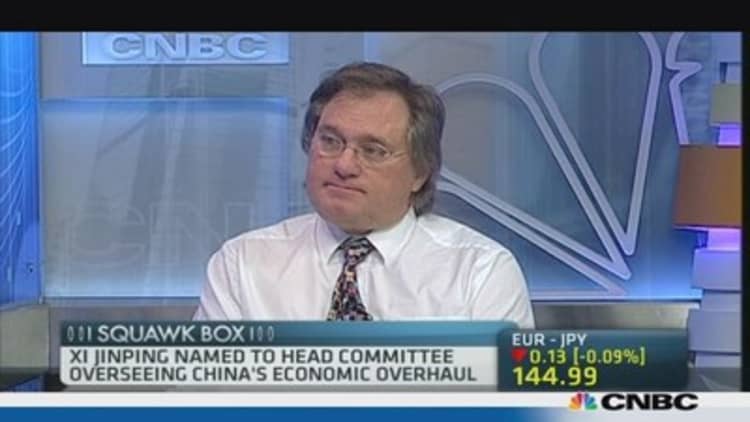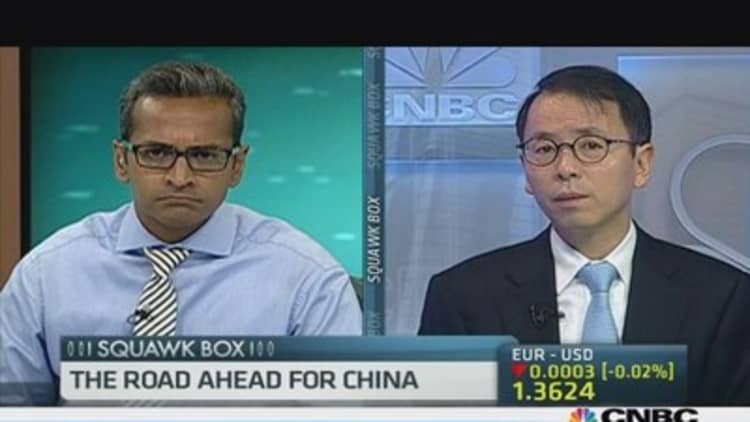China stocks' low valuations may appear mouthwatering to bargain hunters, but if you scratch the surface, the market may not be as cheap as it looks.
Certainly, the valuations look flattering, with Nomura saying "China remains Asia's deepest-discounted market." Shares there are trading at around 8.6 times 12-month forward earnings, 28 percent below the long-term mean of 12 times, according to data from Nomura.
But others say that while the broad market picture might look attractive, things don't look as positive up close.
(Read more: Is China the best of a bad job?)
"China might be significantly more expensive than headline P/E (price-to-earnings) valuations suggest," HSBC said in a note.
"Valuations look very attractive on the surface, but these are flattered by the financial sector which accounts for 40 percent of index earnings," HSBC said. It estimates excluding banks, China stock valuations are a bit below 12 times earnings.

The valuation differential looks even worse if state-owned enterprises, or SOEs, are separated from privately owned enterprises, or POEs, HSBC said. It estimates POEs are trading at more than 25 times earnings, compared with their SOE peers' around 10 times.
(Read more: New year, new woes for China stocks)
HSBC cut its recommendation on China to underweight from neutral, saying earnings visibility is low. While consensus earnings growth expectations of 9.3 percent for 2014 appear reasonable, "the risk to Chinese earnings forecasts should be seen as unusually high this year," HSBC said.
The bank is watching banks' willingness to write off their non-performing loans, especially if companies' cash flow generation slips.
In addition, the mainland's reform drive could significantly impact earnings estimates in some sectors, such as energy, utilities and financials, HSBC said.
(Read more: The risky China assets you may want to own)
Nomura, too, sees reasons to doubt whether valuations of China shares can rise and it rates the MSCI China index at neutral, expecting it will remain rangebound this year.
It expects China stocks may see a "mild" expansion in multiples if the macro-economic outlook remains steady in the first quarter, but believes it may be reversed by mid-year.
"Using Chinese bank shares as an example, overwhelming apprehension appears to have been priced into the valuation of these equities. But equities may not finally bottom until things cannot get any worse," Nomura said in a note last week.

Standard Chartered also doesn't expect the valuations of Chinese shares to rise anytime soon.
"The policy objectives announced at last year's Third Party Plenum have set China on a much healthier medium-term development path. Core to our positive view is the decision to limit growth of China's public sector, the most inefficient part of China's economy," it said in a note last week. "The Plenum marked the end of a four-year de-rating of China equities. The recovery in valuations across the China equity market, however, is likely to be equally gradual."
(Read more: China shares may be cheap, but they could get cheaper)
Some of those who like China's outlook are turning lukewarm. CIMB expects Chinese equities to rise 20 percent in 2014, driven by gains in financial and selected cyclical stocks, but it still downgraded the market to neutral from overweight.
"We expect China to post the highest returns across the region in 2014, but tactically, we are concerned that the negativity surrounding the tightening liquidity and property sector conditions, topping-out in growth data (PMIs) and a resumption of IPO activity will see the market bias turn sideways to down," CIMB said in a note.
—By CNBC.Com's Leslie Shaffer; Follow her on Twitter @LeslieShaffer1

